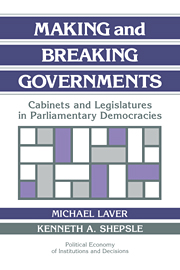Crossref Citations
This Book has been
cited by the following publications. This list is generated based on data provided by Crossref.
Warwick, Paul V.
1996.
Coalition Government Membership in West European Parliamentary Democracies.
British Journal of Political Science,
Vol. 26,
Issue. 4,
p.
471.
Laver, Michael
and
Shepsle, Kenneth
1996.
Collective Decision-Making: Social Choice and Political Economy.
p.
295.
STRØM, KAARE
1997.
Democracy, accountability, and coalition bargaining.
European Journal of Political Research,
Vol. 31,
Issue. 1-2,
p.
47.
Boston, Jonathan
Levine, Stephen
McLeay, Elizabeth
and
Roberts, Nigel S.
1997.
Experimenting with coalition government: Preparing to manage under proportional representation in New Zealand.
The Journal of Commonwealth & Comparative Politics,
Vol. 35,
Issue. 3,
p.
108.
Laver, Michael
1998.
Party policy in Ireland 1997 results from an expert survey.
Irish Political Studies,
Vol. 13,
Issue. 1,
p.
159.
Johnston, R.J.
1998.
Proportional representation and a ‘fair electoral system’ for the United Kingdom.
The Journal of Legislative Studies,
Vol. 4,
Issue. 2,
p.
128.
Taagepera, Rein
1998.
How electoral systems matter for democratization.
Democratization,
Vol. 5,
Issue. 3,
p.
68.
Huber, John D.
1998.
How Does Cabinet Instability Affect Political Performance? Portfolio Volatility and Health Care Cost Containment in Parliamentary Democracies.
American Political Science Review,
Vol. 92,
Issue. 3,
p.
577.
Laver, Michael
1998.
MODELS OF GOVERNMENT FORMATION.
Annual Review of Political Science,
Vol. 1,
Issue. 1,
p.
1.
Baron, David P.
1998.
Comparative Dynamics of Parliamentary Governments.
American Political Science Review,
Vol. 92,
Issue. 3,
p.
593.
Bernhard, William
1998.
A Political Explanation of Variations in Central Bank Independence.
American Political Science Review,
Vol. 92,
Issue. 2,
p.
311.
Austen-Smith, David
and
Banks, Jeffrey S.
1998.
SOCIAL CHOICE THEORY, GAME THEORY, AND POSITIVE POLITICAL THEORY.
Annual Review of Political Science,
Vol. 1,
Issue. 1,
p.
259.
Gravdahl, Hans Petter
1998.
Consensual Coalitions? Coalition Formation in Norwegian Municipalities.
Scandinavian Political Studies,
Vol. 21,
Issue. 4,
p.
307.
Adams, James
and
Merrill, Samuel
1999.
Party policy equilibrium for alternative spatial voting models: An application to the Norwegian storting.
European Journal of Political Research,
Vol. 36,
Issue. 2,
p.
235.
Strøm, Kaare
and
Müller, Wolfgang C.
1999.
The keys to togetherness: Coalition agreements in parliamentary democracies.
The Journal of Legislative Studies,
Vol. 5,
Issue. 3-4,
p.
255.
Volcansek, Mary L.
1999.
Coalition composition and legislative outcomes in Italy.
West European Politics,
Vol. 22,
Issue. 1,
p.
95.
Tsebelis, George
1999.
Veto Players and Law Production in Parliamentary Democracies: An Empirical Analysis.
American Political Science Review,
Vol. 93,
Issue. 3,
p.
591.
Moser, Peter
1999.
The impact of legislative institutions on public policy: a survey.
European Journal of Political Economy,
Vol. 15,
Issue. 1,
p.
1.
Morelli, Massimo
1999.
Party Formation and Policy Outcomes Under Different Electoral Systems.
SSRN Electronic Journal ,
Padgett, Stephen
and
Saalfeld, Thomas
1999.
Introduction.
German Politics,
Vol. 8,
Issue. 2,
p.
1.



